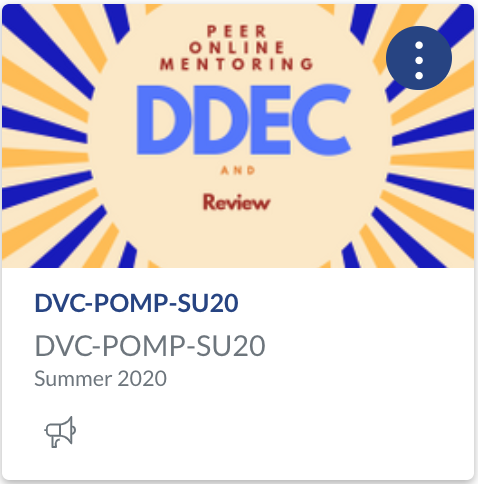Canvas
Teaching Online
DE Committee
 Online Teaching Resources
Online Teaching Resources
Online courses allow us to welcome more students whose work or family schedules are obstacles to taking face-to-face classes, or whose learning styles thrive in the digital environment. Learn more about online teaching by clicking on any of the topics below:
Getting started
Under our UF contract, instructors who teach online need to take our district's Becoming an Effective Online Instructor (BEOI) course or submit evidence of equivalent training. Learn more about online teaching trainings.
- Chrome works well with Canvas and many instructional tech tools. (In fact, some,
like Proctorio, require a Chrome extension.) You - and students! - can download the
latest versions of popular browsers for free:
- Most online instructors use a desktop or laptop with a webcam for hosting synchronous classes or online office hours. Keep up-to-date with the latest version of Zoom.
- Consider what technology your students will need to complete your online class - and communicate those needs with students. Guide students without adequate technology to DVC's Student Technology Loan Requests and Technology Basics Guide.
Online instructors typically email students the week before classes begin to help students understand how to get started in their online course.
There are additional points to add into your syllabus when teaching online, such as any requirements for technology and/or software.
Consider offering office hour(s) online via Zoom to replicate an on campus office hour. Video chat with students, share your screen, or have students share their screen.
- Include your office hour(s) day(s), time(s), and virtual location in easy-to-find places, like your syllabus and Canvas home page.
- Include instructions for how students will access your office hours. Consider sharing the DVC Online Technology Resources course with your students in your welcome letter, orientation module, and more!
- Consider scheduling your Zoom office hours with a waiting room. There may be times you want only one student at a time for quick one-on-one chats, and other times you want to meet with a group of students to review key concepts. The waiting room allows you to control who enters your office space when.
- “Check out the DVC Online Technology Resourceslogy Resources course for all information you might need to set your Zoom sessions up for success
See the Districtwide Guidance on Determining Online Attendance for instructions on tracking attendance in asynchronous or synchronous online classes.
Course design resources
View DVC's Graphic Design and Style Guide, where you'll find materials to help design your Canvas course. Examples include:
- instructions and code for banners, buttons, boxes, and more
- graphic icons
- home page templates
- assignment templates
- discussion board templates
- DVC Online Teaching and Course Design Guidance with an editable home page, orientation module, first week module, and more!
Best practices
![]() Federal and state law requires online courses include regular and effective contact
- both between the instructor and students and among students. DVC Procedure 4003.02 defines our college policies and includes sample activities.
Federal and state law requires online courses include regular and effective contact
- both between the instructor and students and among students. DVC Procedure 4003.02 defines our college policies and includes sample activities.
View the DE Committee's Camera-optional Recommendation to promote equitable virtual experiences and respect student concerns around privacy, safety, disability, and religious strictures.
View the DE Committee's Online Proctoring Recommendation (COVID-19), endorsed by the Academic Senate.
Due to complexities with FERPA compliance, a risk of lost course materials, and technology integration issues, instructors typically cannot combine sections on Canvas, except when courses are already cross-listed in the schedule and meet at the same times. See the 4CD Guidance on Combining Canvas Shells for more.
With the cost of college and student debt rising, utilizing high-quality, free teaching tools is a great way to support your students. Learn more about OER and grant opportunities.
 If you leverage open educational resources over paid publisher content, make sure
students know by getting your course badged with the ZTC (Zero Textbook Cost) symbol
in the online searchable schedule. ZTC means there are no textbook or digital material
costs for students. (However, other costs for physical materials such as a calculator,
lab, or art supplies may be required.) To get your class badged, follow the instructions
in Get Your ZTC Badge.
If you leverage open educational resources over paid publisher content, make sure
students know by getting your course badged with the ZTC (Zero Textbook Cost) symbol
in the online searchable schedule. ZTC means there are no textbook or digital material
costs for students. (However, other costs for physical materials such as a calculator,
lab, or art supplies may be required.) To get your class badged, follow the instructions
in Get Your ZTC Badge.
 In Spring 2019, DVC's Academic Senate approved the CVC Course Design Rubric as a guide for best practices in online teaching. Would you like to participate
in a peer mentorship program to align your online course to the rubric? Learn about
DVC's Peer Online Mentorship Program (POMP) in Online Teaching Training.
In Spring 2019, DVC's Academic Senate approved the CVC Course Design Rubric as a guide for best practices in online teaching. Would you like to participate
in a peer mentorship program to align your online course to the rubric? Learn about
DVC's Peer Online Mentorship Program (POMP) in Online Teaching Training.
 Review (and give feedback!) on our 4CD Equity Rubric to learn about important strategies for creating equitable and inclusive online classes.
Review (and give feedback!) on our 4CD Equity Rubric to learn about important strategies for creating equitable and inclusive online classes.
 All online classes offered within the California Community Colleges have a common
entry point through the learning management system Canvas. Even faculty who supplement
their instruction through third-party resources must have students authenticate through
Canvas to ensure academic integrity.
All online classes offered within the California Community Colleges have a common
entry point through the learning management system Canvas. Even faculty who supplement
their instruction through third-party resources must have students authenticate through
Canvas to ensure academic integrity.
- View our DVC Online Proctoring Recommendation (COVID-19).
- Consider prioritizing authentic assessment and project based learning in the online environment. View past training materials for flex credit in the GROW@4CD Playlist.
- Visit Online Teaching Tools for training on available plagiarism and exam proctoring tools.
 Online instructors need to be aware of FERPA (Family Educational Rights and Privacy
Act) concerns in online courses, particularly around combined sections and Zoom.
Get familiar with FERPA in the DVC FERPA Quick Guide or FERPA Basics video:
Online instructors need to be aware of FERPA (Family Educational Rights and Privacy
Act) concerns in online courses, particularly around combined sections and Zoom.
Get familiar with FERPA in the DVC FERPA Quick Guide or FERPA Basics video:

 Canvas Faculty Guides
Canvas Faculty Guides Online Teaching Resources
Online Teaching Resources Online Teaching Training
Online Teaching Training Online Teaching Tools
Online Teaching Tools Accessibility Resources
Accessibility Resources Staff Development Center
Staff Development Center DE Committee
DE Committee DE Policies and Forms
DE Policies and Forms